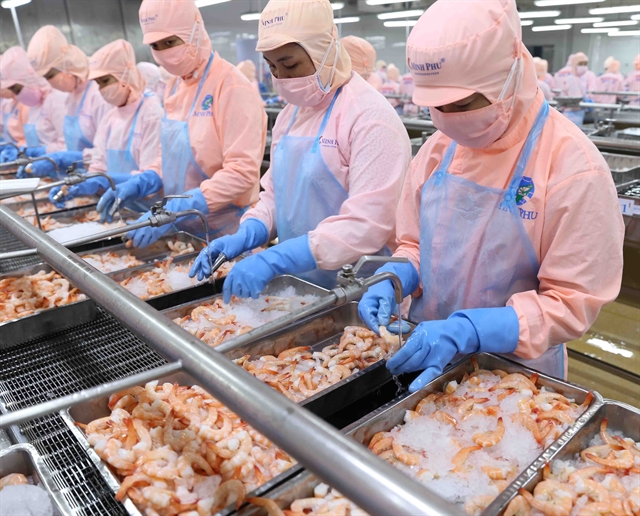 Economy
Economy

 |
| Workers processing shrimp for export at a plant of Minh Phú Seafood. — VNA/VNS Photo |
HÀ NỘI — The domestic seafood industry is witnessing a recovery in investment yields, though growth remains moderate compared to the broader market. Product pricing and competition are leading to significant profit differentials among stocks.
Since the start of 2024, seafood stocks have rebounded, showing a 12.8 per cent increase by August 21. However, profit disparities exist among industry players, trailing the VN-Index's 13.4 per cent surge.
While the export market, notably to the European Union (EU), reflects improvements, Việt Nam still grapples with a yellow card under the Illegal, Unreported and Unregulated (IUU) rule.
Despite concerted efforts by firms and the Government, formidable challenges cast doubt on industry growth sustainability.
Companies are navigating hurdles to foster growth, yet efficiency levels vary. Divergent business strategies, risk management approaches and stock valuations prompt investors to carefully weigh their choices within this sector.
Since early 2024, the investment returns in Việt Nam's seafood sector have displayed encouraging trends. However, not all industry players are reaping the benefits of this resurgence, according to Saigon Times, citing experts from the CFA and Việt Dragon Securities Corporation (VDSC).
Shares of Minh Phú Seafood Corporation (MPC), a key industry player, have seen a minor 1.16 per cent decrease in yield since the year's start, despite a substantial 277.9 per cent surge in the latest quarterly profit after tax.
This highlights the continued impact of factors like stock prices and enterprise valuations on investment choices.
By contrast, Sao Ta Foods JSC (FMC) has achieved a commendable 5.6 per cent rate of return, despite a modest 10.3 per cent profit after tax growth in the latest quarter. This divergence may be attributed to FMC's appealing valuation with a lower price to earning (P/E) ratio, enhancing its investor allure.
Companies like Camimex Group (CMX), Nam Việt Corporation (ANV) and I.D.I International Development & Investment Corporation (IDI) have witnessed diminishing investment yields, predominantly driven by high P/E ratios, coupled with ongoing industry recovery challenges and international trade risks.
Investment performance divergences not only mirror business performances but also hinge on individual firms' development strategies and management proficiencies.
Companies embracing flexibility, product diversification and extensive export channels tend to sustain more consistent profits.
Conversely, businesses heavily reliant on specific products or markets are more vulnerable to market fluctuations and macro-economic uncertainties. The data illustrates that despite evident signs of recovery in the Vietnamese seafood sector, uncertainties still prevail.
Việt Nam's seafood export growth in 2024 is primarily driven by increased export volumes, with prices remaining stable compared to last year.
The total export value has risen by 8 per cent, led by significant growth in the US (11.7 per cent), China (12.2 per cent) and notably the EU (110 percent), despite the EU's yellow card.
In contrast, Japan has seen a slight 0.8 per cent decline, likely due to slow domestic consumption recovery post-pandemic.
Strong export growth to the EU indicates economic revival and growing trust in Vietnamese seafood quality. Noteworthy is this export surge amid economic challenges like inflation and sluggish growth in these key markets.
The domestic's seafood industry is expected to see positive profit growth in 2024, despite stable product prices.
However, long-term investment attractiveness remains uncertain due to high stock valuations and intense competition.
The industry's ability to meet market expectations amid global economic fluctuations is in question.
While short-term prospects are promising, long-term success hinges on factors like international standards, export market stability and government support.
Addressing challenges such as production costs, trade barriers and climate change is crucial.
Investors must carefully assess risks and profitability for prudent long-term investments, leveraging a cautious approach and apply strategic planning to minimise risks and capitalise on market opportunities.
On the stock market, seafood shares all ticked down. FMC, CMX, IDI and ANV on the Hồ Chí Minh Stock Exchange (HoSE) dropped 0.12-1.36 per cent. MPC on UpCOM decreased 2.41 per cent. — VNS




